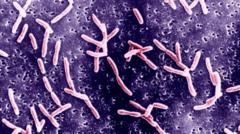In a concerning health crisis, the western Indian city of Pune has reported around 160 cases of Guillain-Barré Syndrome (GBS) since early January. This rare neurological disorder, characterized by the immune system's attack on nerve cells, has left many patients struggling with severe muscle weakness and paralysis. Among the afflicted is a six-year-old boy whose condition deteriorated rapidly, leading to intensive medical care, including ventilator support. Fortunately, he is presently on the path to recovery, but he represents only one of the many cases emerging in Pune, a hub known for its heavy educational and IT presence.
Since the start of this outbreak, five suspected deaths have occurred, and 48 patients remain in intensive care, of whom 21 require ventilators. Healthcare officials are integrating interventions such as increased surveillance, educational campaigns promoting hygiene, and recommendations urging the public to drink boiled water and eat freshly prepared meals to contain the spread of this disease.
The disease onset typically begins with tingling sensations in limbs and escalates to noticeable muscle weakness over several weeks. Experts attribute the surge of GBS cases in Pune to campylobacter jejuni, a pathogen primarily responsible for foodborne illnesses. A link between this pathogen and GBS was established in the 1990s in rural China, where children playing in contaminated water had reported outbreaks. Research indicates that many GBS cases in India may share a similar origin, with a specific strain of campylobacter likely circulating within the Pune area, presenting a heightened risk for the rare disorder.
While GBS cases linked to campylobacter are frequent in regions with poorer hygiene conditions, many occurrences are also reported globally, including Peru, where recent outbreaks have triggered a national health emergency. Vaccines, including COVID-19 vaccines, have occasionally been associated with GBS cases; however, the clear pattern presented by campylobacter and its specific strain in Pune has raised particular alarm for medical professionals.
The risk of developing GBS following campylobacter infection is estimated to be about one in 10,000. Unfortunately, no definitive test exists for diagnosing GBS, making timely and accurate identification crucial yet challenging, especially in rural India where the healthcare system faces considerable strain.
In response to this ongoing crisis, the World Health Organization has dispatched teams to assist local healthcare workers in Pune with case tracking, testing, and management strategies. Specialized hospital wards are being established to provide better care for affected individuals, and health authorities continue to advocate for preventive measures to combat foodborne illnesses.
This outbreak underscores the urgent need to enhance hygiene standards and preventive care in communities to prevent further escalations, amid ongoing tensions between public health advisories and community compliance in the face of fear and uncertainty surrounding GBS.





















